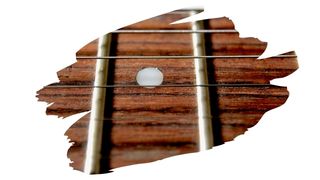If there is one thing every unfinished guitar fretboard needs, it’s conditioning.
Conditioning involves rubbing a non-drying oil into wood. And as the oil soaks into that timber, it rehydrates and reinvigorates wood grain.
Now, some types of fretboard can go without an oil treatment for years, such as Rosewood fretboards. Yet even those fretboards can become parched – and start to crack – in dry sun-baked environments.
Related Post: What Can You Use As A Rosewood Fretboard Finish? (Revealed!)
So this is why, more often than not, rubbing a dab of fretboard oil between those frets can go a long way towards keeping your guitar in good shape.
But, are those lemon-scented fretboard oils your only real conditioning choice? Maybe an alternative option can be found in Walnut oil?
Which, of course, then begs the question… can you use Walnut oil on your guitar fretboard?
Walnut oil – in its unrefined culinary cooking oil form – should not be used on your guitar fretboard (or on any wooden surface). That is because this non-drying oil will go off and go rancid.
When it comes to wood finishes, the type of Walnut oil used on timber surfaces is instead a refined drying oil version of Walnut oil. This special Walnut oil product has been heat treated and filtered of proteins. As a result, it does not go rancid.
However, refined Walnut oil will dry, cure and harden into a brittle coat on the surface of your fretboard. So, it should not be used as a conditioning oil on your guitar either.
With that in mind, what can you use to keep your fretboard from cracking apart?
Well, in this article, you’ll find out why you should keep Walnut oil well away from your instrument. You will also discover what those lemon guitar fretboard oils are really made from.
And we reveal why a bit of petroleum could be the best thing for your fretboard…

This post may contain affiliate links to products that we receive a commission for (at no additional cost to you). Learn more here.
Should You Oil A Guitar Fretboard In The First Place?
Yes, you should, but only if your fretboard is unfinished and unsealed.
However if the fretboard is finished, (which is the case with say Maple fretboards), then it doesn’t need to be oiled. Finished fretboards have already been sealed and protected with a durable finish (usually a drying oil finish or a wipe on poly).
Related Post: Can Tru-Oil Really Finish And Protect Your Maple Fretboard?
Besides, a finished fretboards sealing coat will prevent conditioning oil from soaking through into the wood grain anyway.

How Often Should You Condition A Fretboard?
You should condition your guitars fretboard once every six months.
However, fretboards made from very oily wood types, (such as Rosewood and Ebony), only need oiling once every 1-2 years.
Related Post: What’s The Best Type Of Oil For An Ebony Fretboard? (Revealed!)
And try to resist oiling the fretboard too often. Oiling too frequently isn’t going to do anything other than make that fretboard feel greasy all the time.
OK, So What Can You Use To Condition A Fretboard?
You need to always use a non-drying oil to condition your fretboard. A non-drying oil will sink into dried out wood grain, and bring it back to life.
And just what is a non-drying oil exactly? Well, a non-drying oil is an oil that does just that… it is an oil that does not dry. Which means that it won’t cure and harden either.
A drying oil, on the other hand, will dry. And these types of oils will harden into a pretty durable coat to boot. Oils such as Linseed oil, Tung oil and Tru-oil are classed as drying oils.
Related Post: The Top 3 Tru-oil Alternatives That’ll Give Your Guitar A Fine Finish
And What Kind Of Non-Drying Oil Works Best On A Fretboard?
The only thing you should be using on your fretboard is 100% pure food grade mineral oil. This is the absolute gold-standard conditioning oil for any guitar fretboard.
In fact, many specialized expensive guitar fretboard ‘lemon’ oils are actually just mineral oil (with lemon drops added).
But, you can save money by simply using pure mineral oil directly. In fact, food grade mineral oil can be safely used not only on guitar fretboards, but also on cutting boards, butcher blocks, and even wooden spoons.
Related Post: Walnut Oil Vs Mineral Oil: Which One’s Better For Your Cutting Board?
That’s because food grade mineral oil is made from highly refined petroleum, (otherwise referred to as petroleum distillate). So, this oil won’t go rancid… unlike food-based non-drying oils.
Will Walnut Oil Go Rancid? Unrefined Walnut oil will go rancid and will begin to smell bad.

Food-Based Non-Drying Oils: Why Walnut Oil Is No Good For Conditioning A Fretboard
Culinary non-drying oils, like vegetable oil, coconut oil, and unrefined walnut oil, will go off. And the very last thing you need soaking in your guitar is a rancid smelling oil that you can’t remove.
But, even the filtered heat treated version of Walnut oil isn’t right for conditioning either.
To be sure, heat treated Walnut oil will soak into wood just like mineral oil. However, it is a drying oil, which means it will also build up a solid film on the surface of wood.
A few coats of this stuff, (built up over a couple years worth of conditioning), will start to gather around the frets… making your guitar unplayable.
Related Post: Walnut Fretboards Vs Rosewood (Is Walnut Better Than Rosewood?)
Can You Maybe Use Walnut Oil To Finish A Guitar Fretboard?
You can use a heat treated Walnut oil wood finish to seal a guitar fretboard. It would work just as well as any Linseed oil or Tung oil coat.
However, there are better options out there when it comes to finishing a guitar fretboard. For example, Tru-oil will dry much faster, (and leave behind a glossier looking finish), than Walnut oil.
Related Post: Can Tru-Oil Really Finish And Protect Your Maple Fretboard?
To Wrap Up, Here Are The 3 Key Takeaways…
- 1). Unrefined Walnut oil should not be used to condition your guitar (it’ll only go rancid).
- 2). You should also avoid using heat treated refined Walnut oil, as this wood finish is a drying oil.
- 3). If you want to condition your fretboard, use the non-drying food grade pure mineral oil.



